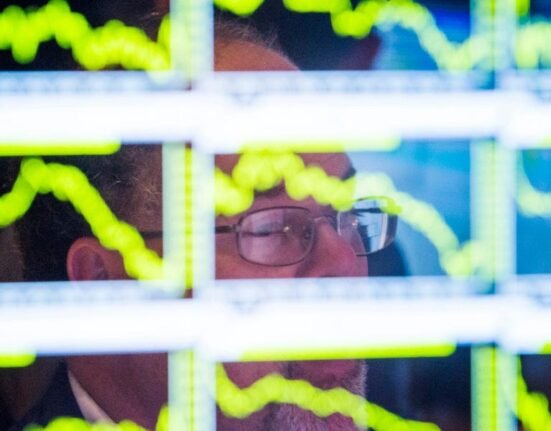Investing your money in the stock market is a great way to grow your wealth in the long term, and the earlier you start, the more time your investments have to compound.
While that sounds straightforward, current market conditions might give aspiring investors reason for pause. The S&P 500 is down almost 10% year-to-date as stocks continue to sell off from trade war concerns.
Kristen Jauregui made it her goal to start investing this year, but she’s been discouraged by the market volatility and has decided to wait until things calm down before buying in. The possibility of investing money into the market and immediately seeing it shrink after another tariff negotiation triggers a sell-off is unappealing to her.
“It’s something that I had been trying to get involved in because it’s time to diversify my assets, it’s time to grow my money so I have a better future later on, but with the way that everything is shifting right now, I get anxiety reading the news,” Jauregui, a 35-year-old payroll specialist, told Business Insider.
Harry Woodland started investing in stocks during the week of April 7, just as tariff news was swinging the market wildly. He began by buying ETFs tracking the global stock market and individual companies like Alphabet (GOOGL) and Nvidia (NVDA), he said.
“I’m actually investing a little bit after the tariffs came out, so I’m sort of catching up,” the 27-year-old, who runs a landscaping business, told BI. “I definitely have concerns about the whole geopolitical situation. It’s a very, very volatile market right now.”
If you’re in a similar boat to Jauregui and Woodland, fear not. Katie Klingensmith, the chief investment strategist at Edelman Financial Engines, has the following advice for those who are looking to dip their toes into investing but aren’t sure how to start.
Make a schedule and stick with it
The most important thing is having a regular plan, according to Klingensmith. It could be as simple as putting $50 into your portfolio every paycheck, as long as you’re following a consistent buying schedule — a practice known as dollar cost averaging where you buy when the market is both up and down. This will create healthy financial habits and help you build up your portfolio at a steady pace, she said.
“Even if they’re relatively small amounts, over the long term those compound dramatically, so investing a little bit early can make a huge difference over the long run,” Klingensmith said.
You might be tempted to save up your cash and wait until you have a larger sum to invest, but that’s not necessary and might actually be suboptimal. It’s hard to time the market correctly and enter at the right point.
“If you’re systematically buying every paycheck, then sometimes you’re going to be buying at the absolute cheapest point, sometimes at a medium point, and sometimes at a more expensive point,” Klingensmith said. It’s OK to not buy in at the low all the time — dollar cost averaging helps investors smooth out the cost of investing.
Please help BI improve our Business, Tech, and Innovation coverage by sharing a bit about your role — it will help us tailor content that matters most to people like you.
What is your job title?
(1 of 2)
What products or services can you approve for purchase in your role?
(2 of 2)
this data to improve your site experience and for targeted advertising.
By continuing you agree that you accept the
Terms of Service
and
Privacy Policy
.
Thanks for sharing insights about your role.
Start simple
If it’s your first foray into the stock market, stick with the basics, like index funds, ETFs, and blue-chip stocks, Klingensmith said.
For those with a longer investing horizon, it makes sense to have a higher risk tolerance as there’s more time to weather the ups and downs of the market. Younger investors can often put up to 100% of their portfolio into equities and gradually dial down the risk as they age.
Woodland’s applying this mindset to his investing strategy and taking some risks on individual stocks while he’s young. “The Big Tech stuff in my portfolio does worry me a bit, but it’s offset by my recovery period. I’ve got a long time to invest,” Woodland told Business Insider.
Steer clear of the more complicated investment vehicles though, Klingensmith warns.
“Lots of people are talking about private credit, private debt, or real estate,” Klingensmith said. “It doesn’t tend to be for the smaller investor because at least at this point, those investments are hard to get into and out of.”
Examples of index funds that provide broad exposure to the market include the SPDR S&P 500 ETF (SPY), the Vanguard Total World Stock Index Fund (VT), and the iShares MSCI World ETF (URTH).
Stay diversified
Staying diversified sounds deceptively simple, but it’s often hard to heed this tip when the stock market is doing well. For example, if you started investing last year, you might have been tempted to allocate a large portion of your portfolio to Magnificent Seven stocks due to their stellar performance. Now, you might be wishing that you had more exposure to the utilities sector.
While it’s exciting to invest thematically, such as betting big on the AI trend, that’s not the best foundation to base your portfolio on, according to Klingensmith.
“The winners within the stock market change. Five years ago nobody would have dreamed that AI would have been this much of a leader in 2024,” Klingensmith said. “If you are purchasing a broad basket of securities, you’re much more likely to have some winners.”
Both institutional and retail investors had been betting on US exceptionalism fueling stocks in the last couple of years, but the trade war has proven that the strategy isn’t watertight.
“Honestly, prior to the tariffs, I would have invested my money into an S&P 500 fund, but I’ve actually decided to go for the Invesco FTSE All World fund, mainly because I don’t really feel comfortable in investing wholly in US stocks,” Woodland said. “Now, I understand that the All World fund is around 60% US stocks. However, I do feel like I can sleep better at night knowing that there is the insurance of having international exposure as well.”
Be honest with yourself
Before you start investing, you should be aware of your risk tolerance, financial goals, and emotions.
Whether you like it or not, investing is an inherently emotional experience, Klingensmith cautions. “I can’t say enough that all of us, myself absolutely included, are emotional at times like this, and it’s hard not to want to sell investments because they’ve gone down,” she said.
Her advice? Don’t go for more risky investments if you know you can’t handle the stress. Define your financial goals and time horizon, and keep a long-term mindset by avoiding checking on your portfolio daily.
Klingensmith added that it’s not a bad idea to derisk your portfolio and hold more cash at times. Especially during an economic downturn, keeping cash on hand for easy access can be more valuable than investing in the stock market.
“It’s OK to focus on that cash cushion in the short term, just given the amount of uncertainty that’s everywhere, not just in financial markets,” Klingensmith said.







